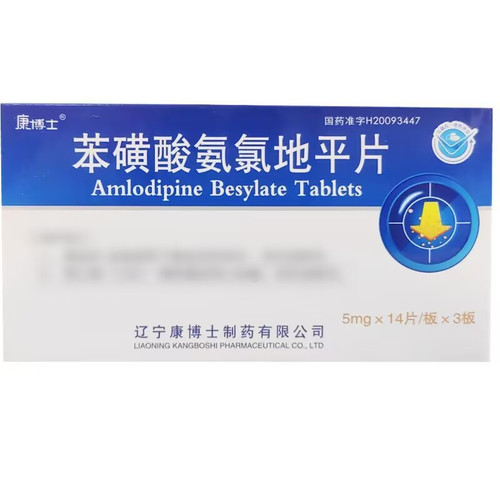Product Overview
[Drug Name]
Generic Name: Amlodipine Besylate Tablets
Trade Name: Nan Guo Chun Amlodipine Besylate Tablets 5mg*63 Tablets
Pinyin Full Code: NanGuoChun BenHuangSuanAnLvDiPingPian 5mg*21Pian*3Ban
[Main Ingredients]
The main ingredient of this product is amlodipine besylate, whose chemical name is: 3-ethyl-5-methyl-2-(2-aminoethoxymethyl)-4-(2-chlorophenyl)-1,4-dihydro-6-methyl-3,5-pyridinedicarboxylate benzenesulfonate. Molecular Formula: C20H25N2O5CI·C6H6O3S. Molecular Weight: 567.1
[Properties]
This product is white or off-white tablets.
[Indications/Main Functions]
1. Hypertension: This product is indicated for the treatment of hypertension. It can be used alone or in combination with other antihypertensive drugs. 2. Coronary Artery Disease (Chronic Stable Angina): This product is indicated for the symptomatic treatment of chronic stable angina. It can be used alone or in combination with other anti-anginal drugs. Vasospastic angina (Prinzmetal's or variant angina): This product is indicated for the treatment of confirmed or suspected vasospastic angina. It can be used alone or in combination with other anti-anginal drugs. In patients with angiographically confirmed coronary artery disease (CAD), an ejection fraction ≥ 40%, and no heart failure, this product can reduce the risk of hospitalization for angina and the need for coronary revascularization.
[Specifications]
5mg * 21 tablets * 3 plates
[Dosage and Administration]
Adults: The usual starting dose for hypertension is 5 mg once daily, with a maximum dose of 10 mg once daily. For patients who are small, frail, elderly, or have hepatic insufficiency, the starting dose is 2.5 mg once daily; this dose may also be used in combination with other antihypertensive drugs. Dose adjustments should be made based on individual patient response. Generally, dose adjustments should begin after 7-14 days. If clinically necessary, dose adjustments may be made more quickly under close patient monitoring. The recommended dose for the treatment of chronic stable or vasospastic angina is 5-10 mg once daily. Lower doses are recommended for elderly patients and those with hepatic impairment; the effective dose for most patients is 10 mg once daily. The recommended dose for the treatment of coronary artery disease is 5-10 mg once daily. In clinical studies, most patients required a dose of 10 mg/day. Combination use with other antihypertensive and/or antianginal medications: Amlodipine is safe for combination with thiazide diuretics, angiotensin-converting enzyme inhibitors, beta-blockers, long-acting nitrates, and/or sublingual nitroglycerin.
[Adverse Reactions]
See package insert for details.
[Contraindications]
This product is contraindicated in patients with hypersensitivity to dihydropyridines or any of its components. [Precautions]
1. Warning: A very small number of patients, particularly those with severe coronary artery obstructive disease, may experience increased frequency, prolonged duration, and/or worsening of angina pectoris, or acute myocardial infarction, when initiating calcium antagonist therapy or increasing the dose. The mechanism of action is currently unknown. 2. Because the vasodilatory effect of this drug is gradual, rare cases of acute hypotension have been reported following administration of this drug. However, caution should be exercised when using this drug in combination with other peripheral vasodilators in patients with severe aortic stenosis. 3. Use in Patients with Heart Failure: Calcium antagonists should be used with caution in patients with congestive heart failure. In a long-term, placebo-controlled study (PRAISE-2) in patients with non-ischemic heart failure (NYHA class upper to IV), although the incidence of exacerbations of heart failure was not significantly different from placebo, there was an increase in reports of amlodipine-related pulmonary edema. 4. Use in Patients with Impaired Hepatic Function: As with all other calcium antagonists, the half-life of this drug is prolonged in patients with impaired hepatic function, but a recommended dose for this drug in such patients has not yet been established. Therefore, caution should be exercised in such patients. 5. Use in Patients with Renal Failure: Changes in amlodipine blood concentrations are not correlated with the degree of renal impairment; therefore, normal doses can be used. This product cannot be dialyzed. 6. Beta-Blocker Withdrawal: Amlodipine is not a beta-blocker and, therefore, cannot provide protection against the risks associated with abrupt beta-blocker withdrawal; any beta-blocker should be discontinued gradually.






